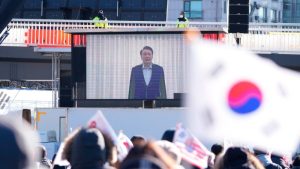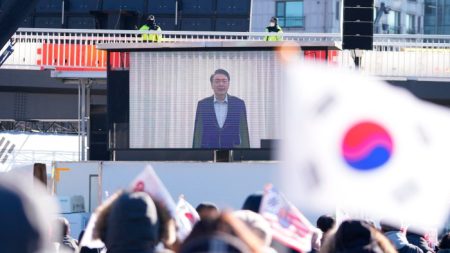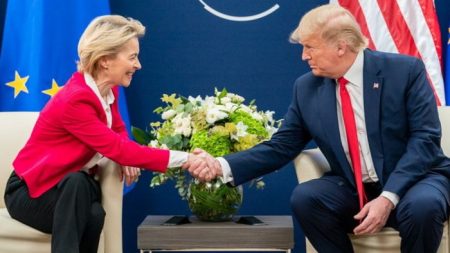Unlock the Editor’s Digest for free
Roula Khalaf, Editor of the FT, selects her favourite stories in this weekly newsletter.
Israeli Prime Minister Benjamin Netanyahu visited Gaza on Monday, meeting with soldiers in the besieged enclave and pledging to push on with the war against Hamas, as pressure on his government increased to recover hostages still held by the militant group.
“Whoever talks about stopping, there is no such thing,” Netanyahu told soldiers on a visit to an army staging ground in the north of the strip, the area of Gaza that has suffered the heaviest bombardment since the start of the war on October 7, and where Israel claims to have secured military control over large areas.
“The war will continue until the end,” Netanyahu said, in an exchange published by the government together with photos of the Israeli leader in military gear, meeting the troops and being briefed by Israel Defense Forces commanders.
But criticism in Israel is growing over the lack of clear military success and the growing death toll among soldiers, as well as the fact that more than 100 hostages are believed to still be held by Hamas and other factions in the Gaza Strip. Hamas has refused to discuss a fresh prisoner exchange without a permanent ceasefire.
Netanyahu was forced to defend the military campaign in Gaza during a speech in the Knesset on Monday, saying “military pressure” was needed for the hostages to be freed and said Israel would “turn over every stone” to achieve this goal. The war “is not close to being over”, he added.
He also said he had contacted Russia, China and the Pope for help, as families of hostages protested, interrupting his speech to Israel’s parliament with cries that there was “no time” to wait any longer for the release of their loved ones. Relatives also fear that hostages may be killed in Israel’s intense bombardment of the Gaza Strip.
Israel’s opposition leader Yair Lapid said that the return of the hostages had to come first as a goal, and that the destruction of Hamas as a military force could be achieved subsequently. “That is what the strong side does.”
More than 20,600 Gaza residents have been killed, Palestinian health authorities said on Monday, since the start of the war on October 7, when Hamas militants attacked southern Israel, killing 1,200 people, according to Israeli authorities.
Israel responded to that assault with a massive air and land offensive in Gaza, intended to eradicate Hamas in the enclave, that is now in its 11th week. Christmas Eve became one of the deadliest nights in the campaign following Israeli air strikes on the Maghazi refugee camp in central Gaza.
An Israeli air strike also hit a suburb of Syrian capital Damascus on Monday, killing senior Iranian military adviser Razi Mousavi, Iran’s state news agency cited the country’s elite Revolutionary Guards as saying.
Israel has previously struck targets in Syria linked to Iran, which backs Hamas in Gaza and also supports Hizbollah, the militant group fighting Israel across the country’s northern border with Lebanon.
Mousavi “was in charge of logistics support” in Syria for Iran’s efforts to support Hamas, state news agency IRNA cited the Guards as saying. It also linked Mousavi to the head of the Guards’ Quds Force, Qassem Soleimani, who was killed by the US in 2020 in a drone strike in Baghdad. The Guards said Israel would “pay” for the killing of the general, Reuters reported.
Hopes that a fresh proposal made by Egypt in recent days could open the way to a ceasefire and hostage deal quickly floundered on Monday as Hamas repeated that it would not engage in talks without “a comprehensive cessation of aggression”, and on the Israeli side, a minister on the political far right publicly decried the plan.
Pope Francis and the Archbishop of Canterbury spoke of the war in Gaza during their Christmas messages. The pope spoke of the “abominable” attack on Israel on October 7, and described the many thousands of children killed in Gaza and in other wars around the world as the “little Jesuses of today”.
Addressing about 70,000 people in St Peter’s Square, the pope said he was pleading “for an end to the military operations with their appalling harvest of innocent civilian victims, and [I] call for a solution to the desperate humanitarian situation by an opening to the provision of humanitarian aid”.
“The skies of Bethlehem are full of fear,” Justin Welby, the Archbishop of Canterbury, said, referring to the Palestinian town in the occupied West Bank where Christians believe Jesus was born.
Israel’s foreign affairs minister on Monday said he had instructed the ministry to expel a UN employee from the country by refusing to extend their visa, and to deny a visa request made by the UN for another of its employees, criticising the organisation of “hypocrisy”.
“The conduct of the UN since October 7th is a disgrace to the organisation and the international community,” Eli Cohen wrote on the platform X, claiming the UN had in effect ignored the crimes committed by Hamas in southern Israel. “We will stop working with those who co-operate with the Hamas terrorist organisation’s propaganda,” Cohen said.
Additional reporting by Amy Kazmin in Rome
Read the full article here












